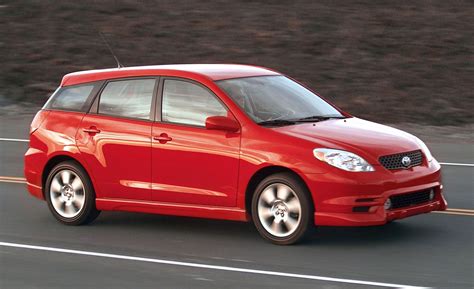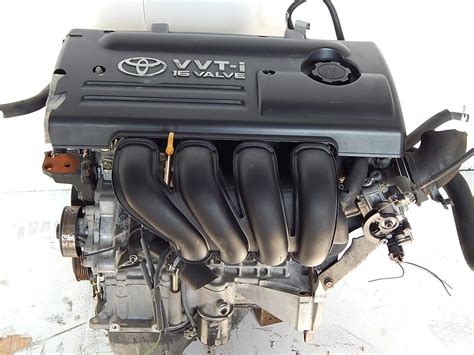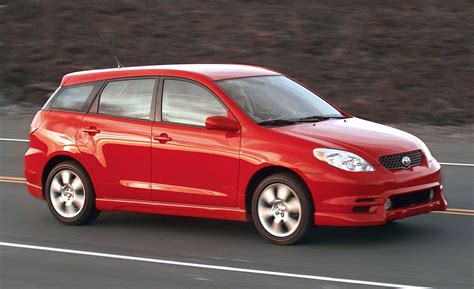2003 Toyota Corolla matrix problems

The Toyota Matrix, officially named Toyota Corolla Matrix, is a compact hatchback manufactured by Toyota Motor Manufacturing Canada in Cambridge, Ontario and derived from the Corolla. Introduced in 2002 as a 2003 model, the Matrix was the result of a joint venture between Toyota and General Motors, with the GM version being the Pontiac Vibe, which was assembled by New United Motor Manufacturing, Inc. (NUMMI) in Fremont, California, United States.
The Matrix was positioned as a sporty hatchback counterpart of the North American Corolla and was counted as a variant of it in Toyota's sales figures.
Although identical mechanically, and nearly as much internally, the Matrix and Vibe had different sheetmetal and exterior trim designed by their respective brands. Both vehicles are narrow, tall station wagons styled in a quasi-SUV fashion (called a crossover utility vehicle or "CUV" by Toyota) and marketed to a fairly youthful market segment. This type of car is also commonly referred to as a sport wagon.
First sold in February 2002, the Matrix saw a minor facelift for the 2005 model year, and was redesigned completely in 2008 for the 2009 model year, following the tenth generation Corolla. Sales of the Matrix were discontinued in the United States in 2013 and in Canada in 2014.

Social links
Common 2003 Toyota Corolla matrix problems
Based on complaints from owners of the 2003 Toyota Corolla Matrix, several common problems have been reported:
- Engine Problems: Owners have experienced issues with the engine consuming excessive oil, leading to engine failure. This issue typically manifests with ticking or rattling noises coming from the engine, ultimately resulting in engine failure, often around 103,300 miles. Repair costs for this engine problem can amount to $3,400.
- Transmission System: The transmission system in the 2003 Toyota Matrix has been reported to be prone to failure, especially in manual models. Symptoms of transmission issues include loud grinding noises, hesitation while shifting, and the absence of the fifth gear. These problems can significantly impact the driving experience and require attention to prevent further damage.
- Check Engine Light Due to Faulty Oxygen Sensor: Another common problem reported by owners is the illumination of the check engine light due to a faulty oxygen sensor. This issue can lead to erratic shifting, whining noises from the floorboard, and frequent hesitation in the transmission system. Addressing this problem promptly is crucial to maintain the vehicle's performance and efficiency.
- Rattles and Vibrations: High revving of the engine in the 2003 Toyota Matrix has been associated with rattles and vibrations, particularly when accessing power. This issue can affect the driving experience and may require inspection to identify the root cause and necessary repairs.
- Low-End Torque: Some owners have noted a lack of low-end torque in the 2003 Toyota Matrix, impacting acceleration and overall performance. This issue can be particularly noticeable during acceleration and may require adjustments or repairs to enhance the vehicle's power delivery.
These common problems reported by owners of the 2003 Toyota Corolla Matrix highlight key areas of concern that can affect the vehicle's reliability and performance. Addressing these issues promptly through proper maintenance and repairs is essential to ensure the longevity and optimal functioning of the vehicle.

What is the most common problem with Toyota Matrix?
One of its most severe issues is the engine problem. Many owners have noticed that the car consumed too much oil and heard ticking or rattling noises coming from the engine. Eventually, the Matrix engine just failed.
How many miles will a 2003 Toyota Matrix last?
The Matrix has a Corolla engine... without a doubt the most reliable engine ever built. If the maintenance schedule was followed from new, a Matrix should last well over 300k miles.
What are the pros and cons of the 2003 Toyota Matrix?
Good room and handling. Ride is stiff. Gas mileage good. Noisy engine.
What are the disadvantages of the Toyota Matrix?
Worst Issues
- excessive oil consumption in the 2009 Matrix. ...
- engine failure in the 2003 Matrix. ...
- premature brake wear in the 2010 Matrix. ...
- engine noise with cold start in the 2009 Matrix. ...
- transmission stopped working in the 2003 Matrix.
What is the common problem of Toyota Matrix?
The Matrix is reliable, but it still has common issues such as faulty oxygen sensors, premature brake wear, excessive oil consumption, and window regulator problems. The Matrix's practicality and reliability make it an attractive option in the used-car market.
What are the disadvantages of the Toyota Matrix?
Worst Issues
- excessive oil consumption in the 2009 Matrix. ...
- engine failure in the 2003 Matrix. ...
- premature brake wear in the 2010 Matrix. ...
- engine noise with cold start in the 2009 Matrix. ...
- transmission stopped working in the 2003 Matrix.
Is Toyota Corolla Matrix a good car?
According to carparts.com, the Toyota Matrix has good reliability ratings, such as a four out of five or a reliability score of 81 out of 100. This could be attributed to the fact that the Matrix is basically a Toyota Corolla, just with a larger trunk.
How many miles will a 2003 Toyota Matrix last?
The Matrix has a Corolla engine... without a doubt the most reliable engine ever built. If the maintenance schedule was followed from new, a Matrix should last well over 300k miles.
2003 Toyota Corolla matrix complaints
The NHTSA has received 0 complaints about various vehicle components related to the 2003 Toyota Corolla matrix.
You can leave your car complaint via the special form below.
2003 Toyota Corolla matrix recalls
The National Highway Traffic Safety Administration (NHTSA) has issued 5 recalls for different components of the 2003 Toyota Corolla matrix.
- Manufacturer: Toyota Motor Engineering & Manufacturing
- Components: AIR BAGS:FRONTAL:PASSENGER SIDE:INFLATOR MODULE
- Summary: On January 9, 2018, Toyota Motor Engineering & Manufacturing (Toyota) notified NHTSA that they are recalling 14,585 model year 2010-2012 Yaris vehicles ever registered in the states of Alaska, Arizona, Arkansas, Colorado, Connecticut, Delaware, District of Columbia, Idaho, Illinois, Indiana, Iowa, Kansas, Kentucky, Maine, Maryland, Massachusetts, Michigan, Minnesota, Missouri, Montana, Nebraska, Nevada, New Hampshire, New Jersey, New Mexico, New York, North Carolina, North Dakota, Ohio, Oklahoma, Oregon, Pennsylvania, Rhode Island, South Dakota, Tennessee, Utah, Vermont, Virginia, Washington, West Virginia, Wisconsin, and Wyoming. As of January 30, 2018, Toyota is additionally recalling 3,347 model year 2010 Pontiac Vibe vehicles located in states listed above. Also included in this recall filing is 98,194 model year 2003-2008 Toyota Corolla Matrix vehicles, located throughout the U.S., that previously received a like-for-like interim air bag inflator replacement. These vehicles are equipped with certain air bag inflators assembled as part of the passenger frontal air bag modules used as original equipment or replacement equipment. In the event of a crash necessitating deployment of the passenger frontal air bag, these inflators may explode due to propellant degradation occurring after long-term exposure to absolute humidity and temperature cycling.
- Consequence: An inflator explosion may result in sharp metal fragments striking the driver or other occupants resulting in serious injury or death.
- Remedy: Toyota will notify owners, and dealers will replace the passenger frontal air bag assemblies with an alternate inflator, free of charge. The recall began on January 29, 2018. Owners may contact Toyota customer service at 1-800-331-4331. Toyota's numbers for this recall are G0R (Zone B), and H0A (Zone C), J0A (Matrix Zone A), J0A (Matrix Zone A), J0A (Matrix Zone A).
- Manufacturer: Toyota Motor Engineering & Manufacturing
- Components: AIR BAGS
- Summary: Toyota Motor Engineering & Manufacturing (Toyota) notified the agency on May 13, 2015 that they are recalling certain model year 2004 Sequoia vehicles manufactured August 18, 2003, to August 19, 2004, and 2003-2004 Tundra vehicles manufactured March 18, 2003, to August 25, 2004. On June 16, 2015, Toyota expanded the recall to include an additional 1,270,468 vehicles, including model year 2002-2003 and 2005-2007 Sequoia, 2005-2006 Tundra, 2003-2007 Corolla, 2003-2007 Corolla Matrix, 2003-2007 Pontiac Vibe and 2002-2007 Lexus SC vehicles. This is to address a safety defect in the passenger side frontal air bag inflator which may produce excessive internal pressure causing the inflator to rupture upon deployment of the air bag. This recall addresses both the passenger side frontal air bags that were originally installed in the vehicles, as well as replacement air bags that may have been installed as replacement service parts. A replacement air bag may have been installed, as one example, if a vehicle had been in a crash necessitating the replacement of the passenger side frontal air bag.
- Consequence: In the event of a crash necessitating deployment of the passenger's frontal air bag, the inflator could rupture with metal fragments striking the vehicle occupants potentially resulting in serious injury or death.
- Remedy: 2003-2004 Corolla and Corolla Matrix vehicles that are recalled under both 15V-043 and 15V-285 are under a Do Not Drive advisory. Owners of these vehicles are advised not to drive their vehicles until the recall remedy has been completed. Toyota will notify their owners. Pontiac Vibe owners will be notified by GM. Dealers will replace the front passenger air bag. The recall began on July 13, 2015. Toyota owners may contact Toyota customer service at 1-800-331-4331. Pontiac owners may call 1-800-762-2737. NOTE: This recall supersedes recall 14V-312 in its entirety.
- Manufacturer: Toyota Motor Engineering & Manufacturing
- Components: AIR BAGS
- Summary: Toyota Motor Engineering & Manufacturing (Toyota) notified the agency on May 13, 2015, that they are recalling 2005-2007 Lexus SC, Toyota Corolla, Corolla Matrix, Sequoia, and Pontiac Vibe, and 2005-2006 Toyota Tundra vehicles that were originally sold, or ever registered, in Florida, along the Gulf Coast, Puerto Rico, Hawaii, the U.S. Virgin Islands, Guam, Saipan and American Samoa. On June 16, 2015 Toyota expanded the recall to cover an additional 769,055 vehicles, including certain model year 2002-2004 Lexus SC, Toyota Sequoia, 2003-2004 Toyota Corolla Matrix, Toyota Corolla, Pontiac Vibe, and Toyota Tundra vehicles, as well the vehicles covered by the May 13, 2015 notification in the portions of Georgia, Alabama, Louisiana, Mississippi and Texas that were not previously included. The inflators in the front passenger air bags are susceptible to rupture in the event of a crash necessitating the deployment of the front passenger air bag.
- Consequence: In the event of a crash necessitating deployment of the passenger's frontal air bag, the inflator could rupture with metal fragments striking the vehicle occupants potentially resulting in serious injury or death.
- Remedy: 2003-2004 Corolla and Corolla Matrix vehicles that are recalled under both 15V-043 and 15V-286 are under a Do Not Drive advisory. Owners of these vehicles are advised not to drive their vehicles until the recall remedy has been completed. Toyota will notify their owners. Pontiac Vibe owners will be notified by GM. Dealers will replace the passenger side front air bag, free of charge. Owners may contact Toyota customer service at 1-800-331-4331. Toyota began the recall on July 13, 2015. Pontiac Vibe owners may contact GM at 1-800-762-2737. GM began the recall on June 29, 2015. NOTE: This recacll supersedes recall 14V-655 in its entirety. For vehicles located in the U.S. states not listed above, please see Toyota recall 15V-285 which covers all other U.S. states.
- Manufacturer: Toyota Motor Engineering & Manufacturing
- Components: AIR BAGS:FRONTAL
- Summary: Toyota Motor Engineering & Manufacturing (Toyota) is recalling certain model year 2003-2004 Toyota Corolla vehicles manufactured December 28, 2001, to May 2, 2004, 2003-2004 Toyota Corolla Matrix vehicles manufactured January 6, 2002, to April 29, 2004, 2003-2004 Avalon vehicles manufactured June 5, 2002, to December 20, 2004, and 2003-2004 Pontiac Vibe vehicles manufactured January 18, 2002, to April 27, 2004. Due to electrical noise, a component in the air bag control module may fail, causing the front air bags, side air bags, and/or seatbelt pretensioners to deploy inadvertently while the vehicle is being operated.
- Consequence: Inadvertent deployment of the air bags or the seat belt pretensioners increases the risk of an injury or crash.
- Remedy: Toyota will notify their owners. Pontiac Vibe owners will be notified by GM. Dealers will replace the air bag control module, free of charge. The recall began on August 24, 2015. Toyota owners may contact Toyota customer service at 1-800-331-4331. GM issued an interim notification to owners on March 27, 2015. The recall began on August 24, 2015. Pontiac owners may call 1-800-620-7668. Note: This recall supersedes recalls 13V-029 and 14V-147. Vehicles that had a noise filter installed as the remedy for one of those campaigns need to have the air bag control module replaced under this campaign.
- Manufacturer: Toyota Motor Engineering & Manufacturing
- Components: AIR BAGS
- Summary: Toyota is recalling certain model year 2003-2004 Corolla and Corolla Matrix vehicles and 2003-2004 Pontiac Vibe vehicles. The supplemental restraint system (SRS) circuits are susceptible to internal shorting. The electrical short may create an abnormal current flow and increased heat which can damage the circuits. This could result in an inadvertent deployment of the front airbags and/or seat belt pretensioners.
- Consequence: Inadvertent deployment of the airbags or the seat belt pretensioners may increase the risk of injury and the possibility of a vehicle crash.
- Remedy: Toyota will re-notify their owners who have already had their vehicles repaired with a noise filter, but did not receive a new airbag control module, and General Motors will re-notify theirs. Dealers previously installed a supplemental harness containing an electrical filter between the airbag control module and its wire harness, free of charge. Dealers will replace the airbag control module, free of charge. The recall began on March 13, 2013. The manufacturer has not yet provided a schedule for second notices. For more information, Toyota owners may call 1-800-331-4331 and Pontiac owners may call 1-800-620-7668.
Additional sources
More sources of information about 2003 Toyota Corolla matrix problems:
03 matrix xrs info | Toyota Nation Forum
Apr 12, 2012 ... Corolla 9th Gen/1st Gen Matrix (2003-2008) ... transmission, is there any common problems I should know about matrix? ... 2002 Toyota Corolla S, 1.8 ...
Here Are The Toyota Matrix Years To Avoid - CoPilot
May 17, 2023 ... According to the folks at RepairPal, the Matrix has a reliability rating of 4.0 out of 5.0, which isn't surprising when it's essentially a ...
2003-2008 Corolla, Matrix, Pontiac Vibe: Common Problems and ...
Jul 28, 2023 ... I have a manual and drive all highway. My mileage is ridiculously good during the summer. 2006 Toyota Matrix 2002 Mazda Miata.
2003 Toyota Matrix Problems and Complaints - 8 Issues
Top 2003 Toyota Matrix Problems · Check Engine Light Due to Oxygen Sensor Failure · Check Engine Light Due to EVAP System · Bolts That Attach Front Window Glass to ...
Looking at a 2003 matrix xr 300 k miles | Toyota Nation Forum
Mar 15, 2018 ... Yours being 4 years older with 300k miles and first year reliability issues I'd say $2000 is way too high. If you are comfortable doing your own ...
Other years of Toyota Corolla matrix






Are you having problems with your 2003 Toyota Corolla matrix?



Leave your review of 2003 Toyota Corolla matrix